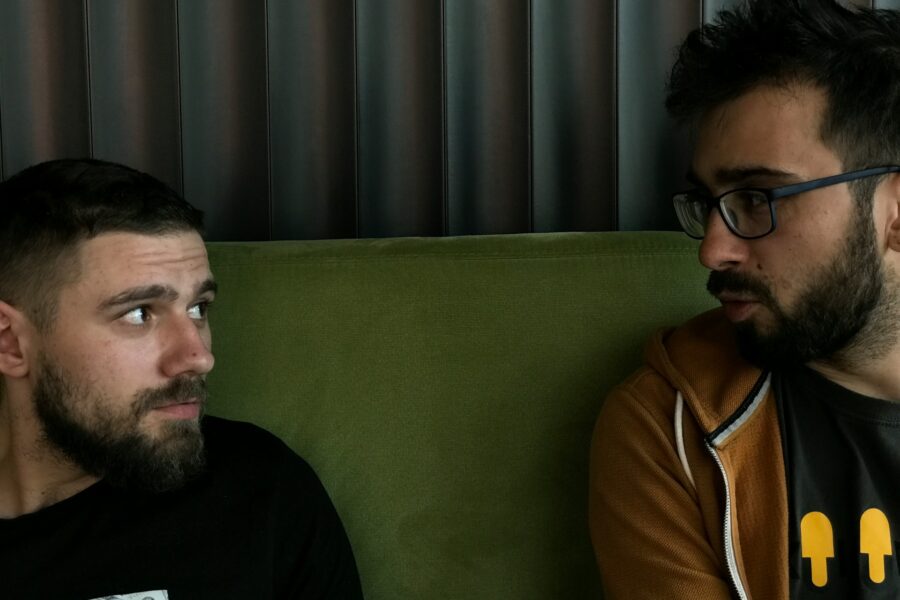Every relationship has its tough moments, but when emotional exhaustion sets in, it’s more than just being tired.

Suddenly, it becomes clear that you’re being stretched too thin to show up properly for each other. That variety of burnout doesn’t always lead to arguments or dramatic fall-outs. Sometimes it sneaks up on you out of nowhere, and if you’re not paying attention, it can start gnawing away at your connection in major ways. Here’s how to spot the signs before resentment builds, and how to check in without getting stuck in a defensive spiral.
1. Conversations feel like a chore instead of a connection.

When emotional energy is low, even casual conversations can feel draining. You might find yourself zoning out, replying with one-word answers, or avoiding deeper topics altogether. That doesn’t mean you don’t care, of course. It might just mean you’re emotionally spent. That being said, if it becomes a pattern, it’s worth asking why talking feels so heavy lately.
2. You’re both always “fine,” but something feels off.

When neither of you is really opening up, things start to feel hollow. You keep saying everything’s okay, but there’s a quiet tension that never fully goes away. Emotional exhaustion often hides behind surface-level peace. If no one wants to be the one to rock the boat, it’s easy to miss the fact that you’re both quietly pulling away.
3. You get irritated over small things that never used to bother you.

The way they chew, the way they load the dishwasher, the way they tell the same story—it all starts to feel like too much. And even though you know it’s not a big deal, you still snap or stew over it. That often means your emotional reserves are low. You’re not reacting to the moment; you’re reacting to the weight of everything that hasn’t been said or sorted.
4. Physical affection starts to fade.

Touch, hugs, or even just sitting close starts to feel less natural. It’s not necessarily rejection; sometimes it’s just emotional fatigue making closeness feel like another thing to manage. If it feels like the intimacy is slipping without explanation, it might not be about attraction. It might be a sign that you’re both too worn out to reach for each other like you used to.
5. You’re always “too busy” for quality time.

Schedules get full, life gets chaotic, but when emotional exhaustion is involved, busyness becomes a shield. You fill your time with tasks so you don’t have to deal with what’s going unspoken. It’s not always conscious, but when the calendar is packed and connection keeps getting postponed, it’s time to ask what’s really being avoided.
6. Every conversation turns into problem-solving.

Instead of simply listening to each other, every chat turns into a planning session or a list of things that need fixing. Emotional space gets replaced with logistics. It’s a subtle change, but it matters. When there’s no room for vulnerability, it’s a sign that something deeper might be getting overlooked, and that both of you are running low on patience and emotional presence.
7. You both avoid certain topics completely.

Some conversations start to feel too risky, too draining, or too likely to spark tension. So, you silently agree not to touch them at all. That kind of avoidance might feel like keeping the peace, but it usually builds more distance. When you’re emotionally tired, even healthy conflict starts to feel like something you just don’t have the energy for.
8. You second-guess their reactions before you say anything.

You find yourself tiptoeing around your words, not because they’ve done anything wrong, but because you don’t want to trigger a shutdown or a disagreement. You feel like you’re always editing yourself a little too much. That’s a sign of emotional tension, not necessarily fear. However, when communication starts getting filtered this heavily, it usually means there’s emotional weight that hasn’t been unpacked between you.
9. You feel more alone when you’re together than when you’re apart.

Spending time together should feel grounding, but when you’re emotionally exhausted, it can feel lonelier than being by yourself. The silence doesn’t feel peaceful; it feels disconnected. That doesn’t mean the relationship is broken. It means there’s a lack of emotional exchange, and both people may be trying to quietly conserve what little energy they have left.
10. One of you keeps overcompensating to keep the other happy.

You notice a subtle imbalance, where one person is constantly trying to smooth things over, offer affection, or initiate conversation, while the other seems emotionally checked out. It can be a sign that one of you is feeling the distance more intensely, and trying to fix it without really naming the issue. Of course, without both people engaging, it becomes a draining cycle.
11. You both stop checking in on how the other is really doing.

Instead of asking, “How are you, really?” you settle for autopilot. You assume things are fine because no one’s complaining, but underneath, both of you might be feeling increasingly unseen. Checking in emotionally takes effort, and when you’re both depleted, it’s often the first thing to go. However, those small moments of care are what keep connection alive.
12. You feel like you’re always trying not to make things worse.

Every choice feels like damage control. You worry that saying the wrong thing or asking for too much will push things further apart, so you just keep your head down and hope things ease up on their own. That walking-on-eggshells feeling is a major red flag for emotional strain. It suggests you’re not just tired; you’re afraid the connection can’t handle any more stress.
13. Your needs feel inconvenient, even to you.

You stop asking for reassurance, affection, or time together because you don’t want to seem needy. You tell yourself to just push through or lower your expectations. It often happens when emotional needs have gone unmet for a while. Instead of feeling safe to express them, you start to silence them, and that silence can feel like safety, even though it’s slowly destroying the bond.
14. The little rituals start to disappear.

Things like saying goodnight, checking in during the day, or sharing inside jokes used to be effortless. Now, they feel forgotten or forced, and no one seems to notice they’ve faded. These rituals aren’t just cute habits. They’re the glue that keeps the emotional connection steady. When they start disappearing, it often reflects deeper emotional fatigue.
15. You feel like you’re both stuck in survival mode.

You’re not fighting. You’re not thriving. You’re just getting through each week, managing tasks, and putting off emotional stuff for later, except later never really comes. The constant low-level tension wears people down. If it feels like the relationship is on autopilot, that’s a sign the emotional reserves have run dry, and it’s time to pause and reconnect, not push through more.
16. You get defensive when any of this gets pointed out.

One of the clearest signs of emotional exhaustion is feeling instantly irritated or shut down when your partner brings up how distant things feel. You might jump to defend yourself before you even really hear them. That doesn’t mean you’re the bad guy; it just means you’re likely tired, too. Getting curious instead of reactive can change the whole tone. It’s not about blame, it’s about noticing where both of you are stretched thin and deciding to care about it together.


